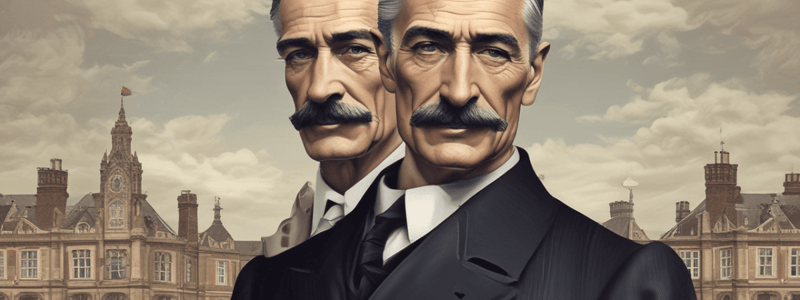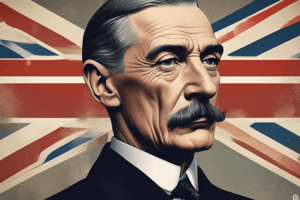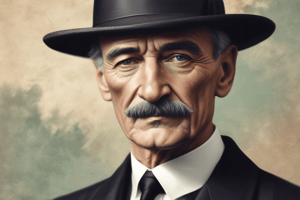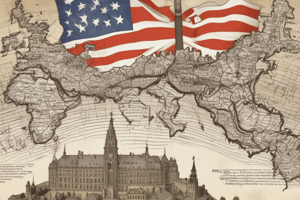Podcast
Questions and Answers
Who became prime minister after Stanley Baldwin's resignation in 1937?
Who became prime minister after Stanley Baldwin's resignation in 1937?
- Winston Churchill
- Neville Chamberlain (correct)
- Lord Halifax
- Hitler
The National Government under Chamberlain was able to rearm quickly due to strong public support
The National Government under Chamberlain was able to rearm quickly due to strong public support
False (B)
What was the name given to the period of inaction between the declaration of war and the start of actual fighting in April 1940?
What was the name given to the period of inaction between the declaration of war and the start of actual fighting in April 1940?
The 'Phoney War'
The British Expeditionary Force was mobilised to ______________________ in 1939.
The British Expeditionary Force was mobilised to ______________________ in 1939.
Why did the Labour Party refuse to serve under Chamberlain in May 1940?
Why did the Labour Party refuse to serve under Chamberlain in May 1940?
Churchill's wartime cabinet consisted only of Conservative politicians
Churchill's wartime cabinet consisted only of Conservative politicians
Match the following politicians with their respective roles:
Match the following politicians with their respective roles:
Why did Halifax step aside and allow Churchill to become prime minister?
Why did Halifax step aside and allow Churchill to become prime minister?
What was the title of Winston Churchill's first speech as prime minister to the House of Commons in 1940?
What was the title of Winston Churchill's first speech as prime minister to the House of Commons in 1940?
Winston Churchill's wartime cabinet served under him until the war ended in 1949.
Winston Churchill's wartime cabinet served under him until the war ended in 1949.
What was the main difference between the British wartime and peacetime economies?
What was the main difference between the British wartime and peacetime economies?
The British government took control of war production and developed specific ministries for controlling the wartime economy, including the Ministry of ______________________.
The British government took control of war production and developed specific ministries for controlling the wartime economy, including the Ministry of ______________________.
Match the following ministries with their responsibilities during wartime:
Match the following ministries with their responsibilities during wartime:
How many aircraft did Britain produce in 1940?
How many aircraft did Britain produce in 1940?
The USA was a belligerent in the war from 1939.
The USA was a belligerent in the war from 1939.
What was the name of the agreement arranged by Winston Churchill in 1940 to supply Britain with resources?
What was the name of the agreement arranged by Winston Churchill in 1940 to supply Britain with resources?
The 'Liberty Ships' provided Britain with an economic lifeline throughout the war by bringing essential raw materials such as ______________________.
The 'Liberty Ships' provided Britain with an economic lifeline throughout the war by bringing essential raw materials such as ______________________.
What was the result of the growth of state intervention in Britain in 1940?
What was the result of the growth of state intervention in Britain in 1940?
Neville Chamberlain was prime minister during a period of economic ______ and falling unemployment
Neville Chamberlain was prime minister during a period of economic ______ and falling unemployment
Chamberlain replaced Stanley Baldwin as prime minister in ______
Chamberlain replaced Stanley Baldwin as prime minister in ______
The British Expeditionary Force was mobilised to ______ in 1939
The British Expeditionary Force was mobilised to ______ in 1939
The 'Phoney War' ended in ______ with a bungled British attempt to save Norway from German invasion
The 'Phoney War' ended in ______ with a bungled British attempt to save Norway from German invasion
Chamberlain narrowly won a vote of ______ on 7 May 1940
Chamberlain narrowly won a vote of ______ on 7 May 1940
Churchill's wartime cabinet was a mix of ______, Labour and Liberal politicians
Churchill's wartime cabinet was a mix of ______, Labour and Liberal politicians
Churchill included Labour politicians mainly from the ______ and right of the party who he believed were ready to place the national interest above party politics
Churchill included Labour politicians mainly from the ______ and right of the party who he believed were ready to place the national interest above party politics
Germany's invasion of ______ occurred on the day Churchill came to power
Germany's invasion of ______ occurred on the day Churchill came to power
On 13 May, as the situation deteriorated in France, Churchill made his first speech as prime minister to the House of Commons offering '_____________________, toil, tears and sweat'.
On 13 May, as the situation deteriorated in France, Churchill made his first speech as prime minister to the House of Commons offering '_____________________, toil, tears and sweat'.
As the German Army swept through France, the British Expeditionary Force withdrew to ______________________, trapped on the beaches and awaiting evacuation.
As the German Army swept through France, the British Expeditionary Force withdrew to ______________________, trapped on the beaches and awaiting evacuation.
Like the government during the First World War, Winston Churchill's government took control of war production and developed specific ministries for controlling the wartime economy, including the Ministry of ______________________.
Like the government during the First World War, Winston Churchill's government took control of war production and developed specific ministries for controlling the wartime economy, including the Ministry of ______________________.
The managed economy was to a large degree maintained by the post-war ______________________ government.
The managed economy was to a large degree maintained by the post-war ______________________ government.
Between 1939 and 1941 the ______________________ offered Britain considerable economic help, despite the fact that the USA was neutral.
Between 1939 and 1941 the ______________________ offered Britain considerable economic help, despite the fact that the USA was neutral.
By December 1940 Britain's cash and gold reserves were ______________________.
By December 1940 Britain's cash and gold reserves were ______________________.
Winston Churchill arranged a credit agreement, known as the ______________________ Agreement.
Winston Churchill arranged a credit agreement, known as the ______________________ Agreement.
These 'Liberty Ships' provided Britain with an economic lifeline throughout the war by bringing essential raw materials such as ______________________.
These 'Liberty Ships' provided Britain with an economic lifeline throughout the war by bringing essential raw materials such as ______________________.
The British government took control of war production and developed specific ministries for controlling the wartime economy, including the Ministry of ______________________.
The British government took control of war production and developed specific ministries for controlling the wartime economy, including the Ministry of ______________________.
In 1940, when Britain appeared to be losing the war, the growth of state intervention resulted in a huge increase in war production and military ______________________.
In 1940, when Britain appeared to be losing the war, the growth of state intervention resulted in a huge increase in war production and military ______________________.
Flashcards are hidden until you start studying
Study Notes
Chamberlain's Premiership (1937-1940)
- Neville Chamberlain became Prime Minister in 1937 after Stanley Baldwin's resignation due to ill health.
- Chamberlain's government faced economic recovery, falling unemployment, and stable prices, but struggled with rearmament due to the growing anti-war movement.
- Concessions were made to Nazi Germany, allowing Hitler to disregard the Treaty of Versailles, due to the desire for peace among the electorate.
- Following the declaration of war in September 1939, the British Expeditionary Force was mobilized to France, but a seven-month stand-off ensued with little action.
- The 'Phoney War' ended with a failed British attempt to save Norway from German invasion, leading to Norway's occupation by Germany.
- Chamberlain faced criticism in Parliament for the handling of the war and narrowly won a vote of no confidence, but ultimately recognized it as a defeat.
- Chamberlain attempted to form a new coalition government but was unsuccessful, paving the way for Winston Churchill to become Prime Minister.
Churchill's Premiership (1940-1945)
- Winston Churchill became Prime Minister on May 10, 1940, and formed a wartime cabinet with a mix of Conservative, Labour, and Liberal politicians.
- Churchill's cabinet included Labour politicians from the center and right of the party who were willing to put national interests above party politics.
- In his first speech as Prime Minister, Churchill offered "blood, toil, tears, and sweat" to the House of Commons, emphasizing the need for British resilience.
- As the German army advanced through France, the British Expeditionary Force withdrew to Dunkirk, awaiting evacuation.
- Churchill rejected calls for a negotiated settlement with Germany, arguing that Britain would become a "slave state" if it agreed to German terms.
Creating a Managed Economy (1939-1945)
- Winston Churchill's government took control of war production, establishing specific ministries to control the wartime economy, such as the Ministry of Aircraft Production and the Ministry of Food.
- The government intervened in the economy, taking over essential war industries and determining production levels, rather than relying on market forces.
- The managed economy was maintained by the post-war Labour government, particularly through the nationalization of key industries.
- Military expenditure increased significantly, with Britain producing 15,000 aircraft in 1940, rising to 47,000 in 1944, and between 6,000 and 8,000 tanks per year.
- The USA provided economic aid to Britain between 1939 and 1941, including the Lend-Lease Agreement, which allowed Britain to receive resources with the promise of payment after the war.
- American 'Liberty Ships' provided Britain with an economic lifeline throughout the war, supplying essential goods and raw materials.
Chamberlain's Premiership (1937-1940)
- Neville Chamberlain became Prime Minister in 1937 after Stanley Baldwin's resignation due to ill health.
- Chamberlain's government faced economic recovery, falling unemployment, and stable prices, but struggled with rearmament due to the growing anti-war movement.
- Concessions were made to Nazi Germany, allowing Hitler to disregard the Treaty of Versailles, due to the desire for peace among the electorate.
- Following the declaration of war in September 1939, the British Expeditionary Force was mobilized to France, but a seven-month stand-off ensued with little action.
- The 'Phoney War' ended with a failed British attempt to save Norway from German invasion, leading to Norway's occupation by Germany.
- Chamberlain faced criticism in Parliament for the handling of the war and narrowly won a vote of no confidence, but ultimately recognized it as a defeat.
- Chamberlain attempted to form a new coalition government but was unsuccessful, paving the way for Winston Churchill to become Prime Minister.
Churchill's Premiership (1940-1945)
- Winston Churchill became Prime Minister on May 10, 1940, and formed a wartime cabinet with a mix of Conservative, Labour, and Liberal politicians.
- Churchill's cabinet included Labour politicians from the center and right of the party who were willing to put national interests above party politics.
- In his first speech as Prime Minister, Churchill offered "blood, toil, tears, and sweat" to the House of Commons, emphasizing the need for British resilience.
- As the German army advanced through France, the British Expeditionary Force withdrew to Dunkirk, awaiting evacuation.
- Churchill rejected calls for a negotiated settlement with Germany, arguing that Britain would become a "slave state" if it agreed to German terms.
Creating a Managed Economy (1939-1945)
- Winston Churchill's government took control of war production, establishing specific ministries to control the wartime economy, such as the Ministry of Aircraft Production and the Ministry of Food.
- The government intervened in the economy, taking over essential war industries and determining production levels, rather than relying on market forces.
- The managed economy was maintained by the post-war Labour government, particularly through the nationalization of key industries.
- Military expenditure increased significantly, with Britain producing 15,000 aircraft in 1940, rising to 47,000 in 1944, and between 6,000 and 8,000 tanks per year.
- The USA provided economic aid to Britain between 1939 and 1941, including the Lend-Lease Agreement, which allowed Britain to receive resources with the promise of payment after the war.
- American 'Liberty Ships' provided Britain with an economic lifeline throughout the war, supplying essential goods and raw materials.
Studying That Suits You
Use AI to generate personalized quizzes and flashcards to suit your learning preferences.




